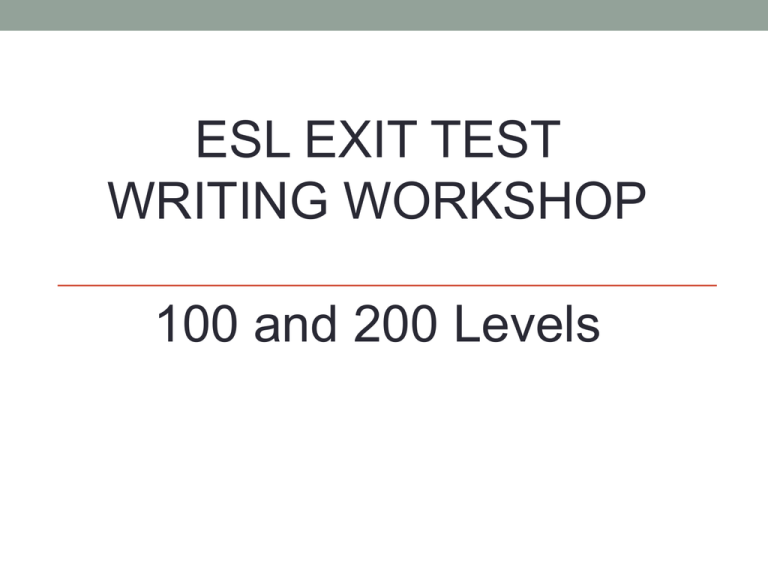ESL EXIT TEST WRITING WORKSHOP 100 and 200 Levels
advertisement

ESL EXIT TEST WRITING WORKSHOP 100 and 200 Levels ESL EXIT TEST Proficiency Test: “ACT Compass English as a Second Language Placement Test” Created by ACT, Inc. 3 Sections: 1. Writing 2. Listening 3. Reading Let’s Begin! Writing Section: Basics • • • • • • 1st Part Two Topics-Choose 1 60 minutes (15 minute & 5 minute Time Warning) Hand-Written No dictionary or cell phones Writing Topic: Opinion, Agree/Disagree, Compare/Contrast, Preference • Analysis of: • Development • Language use • Organization • Focus • Mechanics Development • The reasons, examples, and details that are used to support the stated or implied position. • Beginning Level: The topic is developed using very few examples, which may be general and somewhat repetitious, but they are usually relevant to the topic. • Intermediate Level: The topic is developed using reasons supported by a few examples and details. • Very important: Demonstrates Proficiency Language Use Variety and correctness of sentence structures and word choices, and control of grammar and usage (e.g., word order, word forms, verb tense and agreement) • Beginning Level: Sentence structure is simple, with some errors evident in word order. Word choice is usually accurate but simple. Language control is inconsistent or weak, with many errors in grammar and usage, often making understanding difficult. • Intermediate Level: Most sentences are complete although some may not be correct or clear. Word choice is sometimes appropriate. Although a few errors may impede understanding, basic language control is evident and meaning is sometimes clear. • Very important: Demonstrates Proficiency Organization The clear, logical sequencing of ideas and the use of effective transitional devices to show relationships among ideas • Beginning Level: Writing is composed of sentences which relate to one another; however, there is minimal evidence of a beginning, middle and end to the paragraph. • Intermediate Level: Simplified paragraph form is used with a topic sentence, supporting details, and a conclusion. Transitions, if used, are generally simple and predictable. Focus The clarity and consistency with which the main idea(s) or point of view is maintained • Beginning Level: Focus may be difficult to judge due to the brevity of the response; any digressions generally do not lead back to the task. • Intermediate Level: Focus is usually maintained on the main idea(s); any digressions usually lead back to the task. Mechanics Errors in spelling, capitalization, and punctuation in relation to meaning • Beginning Level: Errors often distract and/or frequently interfere with meaning, or mechanics may be difficult to judge due to the brevity of the response. • Intermediate Level: Errors sometimes distract and they occasionally interfere with meaning. Writing Strategies: Pre: • Take time to understand the question and direction. • 2-3 minute Brainstorm: • Consider all possible main ideas/reasons • Think of details/examples • Eliminate weak ideas and details • 2-3 minute outline • Words/phrases • Think about organization and structure During: • Watch your time! • Try to leave time to go back and edit. • Keep the question in your mind—don’t stray from topic! • Try to be creative-using interesting/unique ideas and details Practice: Take approximately 5 minutes to: 1. Understand topic 2. Brainstorm 3. Outline Question 1: Some people prefer to live in a small town. Others prefer to live in a big city. Which place would you prefer to live in? Use specific reasons and details to support your answer. Question 2: It is better for children to grow up in the countryside than in a big city. Do you agree or disagree? Use specific reasons and examples to develop your essay. Question 3: It has been said, “Not everything that is learned is contained in books.” Compare and contrast knowledge gained from experience with knowledge gained from books. In your opinion, which source is more important? Why? Helpful Websites http://www.act.org/compass/student/tips-essay.html General Strategies: http://www.act.org/compass/student/tips.html On Test Day Bring: 1. Photo ID 2. Student ID Number 3. Pen or Pencil